We must realise that we cannot exist alone and that others, no matter how different they may be in many life situations, are the source of our existence. This is also demonstrated by this pandemic, which is beginning to unite people and nations in the fight against it. So, whether the world will draw lessons from this pandemic, in order to change the way of life, depends largely on those who teach and educate future generations,“ Bishop Ignjatije of Braničevo
“It is clear that the Church needs to take strides forward and innovate at all times, but it is also clear that not every innovation in the Church is in the spirit of the Church,” says His Eminence Bishop Ignjatije of Požarevac-Braničevo and Smederevo in this interview with CorD magazine, in response to the question of the extent to which the church should be open to modernisation in the 21st century. The bishop refutes the widespread thesis regarding the unwillingness of the Serbian Orthodox Church (SOC) to engage in ecumenical dialogue and points to the existence of an official Mixed Commission for dialogue between the Orthodox Church and the Roman Catholic Church, with the aim of achieving unity between the two churches. However, as he says, conditions have not yet been met for Pope Francis to visit Serbia.
In his recent Easter epistle, Serbian Patriarch Irinej urged believers to reflect on themselves and the entire world that has been thrown to its feet by the coronavirus. How did you interpret his words, “Calm down, proud-spirited man”?
The words you cited from this year’s Easter Epistle of the Patriarch, “Calm down, proud-spirited man”, belong to noted 19th-century Russian writer F. Dostoevsky. These words were addressed by Dostoevsky primarily to Western European man, but they also refer to contemporary generations around the world. They are directed as a response to the reaction and behaviour of that man in accordance with the principles of that time that were established by the Age of Enlightenment, and those were that human logic and human reason are an absolute measure of truth, and even of existence. Everything that does not fit into human logic does not exist (we recall Descartes and his phrase Cogito, ergo sum).
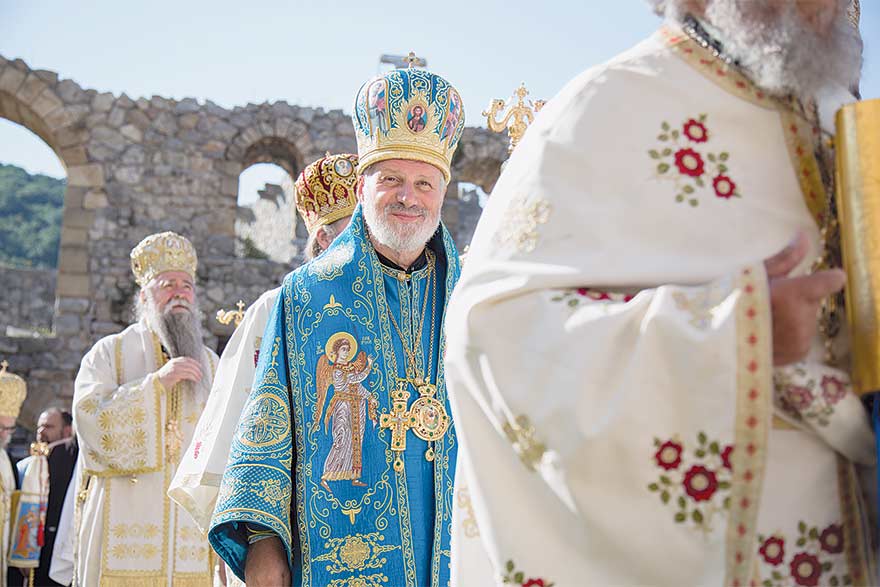
Such an orientation of man, that his reason is a measure of existence and truth, in conjunction with Newton’s understanding of nature as a machine that acts and functions in accordance with the laws of causality that govern it, inspired the development of science and technology that’s the result of a logical analysis of the nature that surrounds us. This, in turn, has resulted in major breakthroughs in the field of science, above all technically, and today also in technology. We need only recall the great modern inventions of the 18th and 19th centuries, such as the lightning rod, steam engine, motor vehicle, the telegraph, telephone, aeroplane etc.
Modern man has forgotten that he cannot exist without the other and without nature. This has also impacted greatly on the religious life of man; he concluded that, like others, he did not need God. Even if he believes in God, he does so only for his own interest. If there is no usefulness, there is no faith
Modern technology, as the name itself implies, is nothing but human logic transposed into technology (we are yet to see the devastating consequences of the development of technology and its application to life; here I mean, among other things, medicine, and thanks to technology, its implications for the human being, i.e. its genetics. What we see now is just that, that human life has become unthinkable without technology. He who does not develop technology or, God forbid, speaks out against it and distances himself from it, is doomed to annihilation! At the same time, thanks to technology, most people have turned the real world into a virtual one and they live within that world.)
All of this has led to deep changes, both to social life as a whole, and to man as a single person. Under the influence of these discoveries and their application in life, modern man has got the impression that he is the absolute master of life and death. He saw himself as a god and thought that there was no other God besides him. Anything that could not be confirmed and justified by human logic was doomed. This relates to religion in particular. It is thus no coincidence that, at this very time, atheism has been emerging as a life philosophy and is preached publicly in society (this was not the case in previous human civilisations).
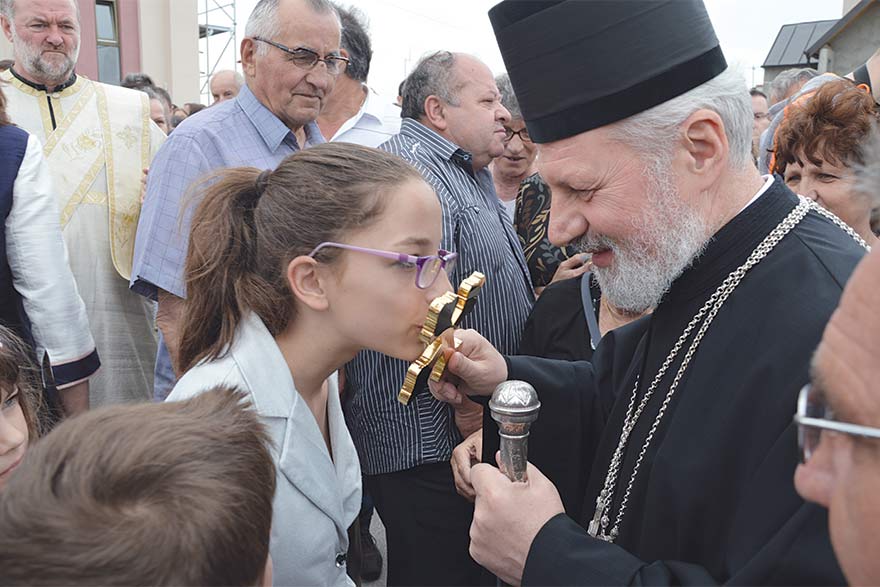
The vast majority of intellectuals who were contemporaries of Dostoevsky believed, with religious conviction, that, through education and the application of modern discoveries, man would create a “paradise on earth” (we recall only Victor Hugo and others), and would do so very soon, in the subsequent 20th century (hence the saying that is found everywhere in Europe when it comes to something that is bad but is not related to logic: “is this even possible in the HH century?!”). This is the reality of modern life that Dostoevsky had in mind when he uttered the words cited. However, Dostoevsky is among the few intellectuals who prophetically reacted to all that optimism and euphoria of his contemporary Western European man, about the creation of “paradise on earth” without God, solely on the basis of human logic and logical human behaviour, predicting it would have catastrophic ramifications for the world. And his prophecy, unfortunately, came to pass. All these discoveries and achievements of modern man that we’ve talked about, and many others that happened in the meantime, of which man was overly proud, were used in two world wars, and in that very 20th century, for the mass destruction of people and nature. Thus man, who thought he had “removed God” and climbed onto his throne, was humiliated by himself and reduced to an animal and even lower than that.
There has been much talk during these months about the Covid-19 pandemic stripping bare all the problems of the modern world, which have emerged as a result of the tendency to create a “false earthly paradise” for individuals, as the patriarch stated. This paradise for individuals often implies an absence of care for the collective, so a strong, high-quality healthcare system for all, for example, is considered a big expense for budgets. How would you respond to the question from the Easter epistle; will the world emerge smarter from the pandemic?
Another important characteristic of our civilisation is that man in Western European civilisation is considered thinking individual and is sufficient in and of himself. In order to exist, he does not need another. If one adds to this the propaganda that is widely utilised today in politics, that man is created for enjoyment and will be provided with that by science and technology, other people and the world as a whole is understood by modern man as objects for research and possible use, i.e. for use that will bring happiness and enjoyment to the individual. Unless they prove to be such, they are not worthy of existing. Hence comes also the relentless exploitation of nature, as well as of other people if they are weaker, for the purposes of one’s own enjoyment.
Modern man has forgotten that he cannot exist without the other and without nature. This has also impacted greatly on the religious life of man; he concluded that, like others, he did not need God. Even if he believes in God, he does so only for his own interest. If there is no usefulness, there is no faith. Of course, he determines on the basis of his own logic what is useful and what is not. The same is true of the healthcare system that you mentioned, and which is most often managed by those who are currently healthy, or who think they are healthy. Since he personally does not need that at the moment, then the cost is set aside for the healthcare system.
The modern education system still insists on the development of human logic and man as an individual, according to that maxim of logic: perfect individuals – perfect society. I don’t think that is so. That’s why we need to change the ontology: from being (existing) as an individual, to being as a community with other
The whole of history, and particularly the events of the last two centuries, are related to scientific discoveries, for which huge sums of money are allocated on the basis of the excuse that they serve to improve living conditions, and which often turn into devices for torturing and killing another person and entire nations by those that are more powerful than them, as well as for exploiting (see: destroying) nature.
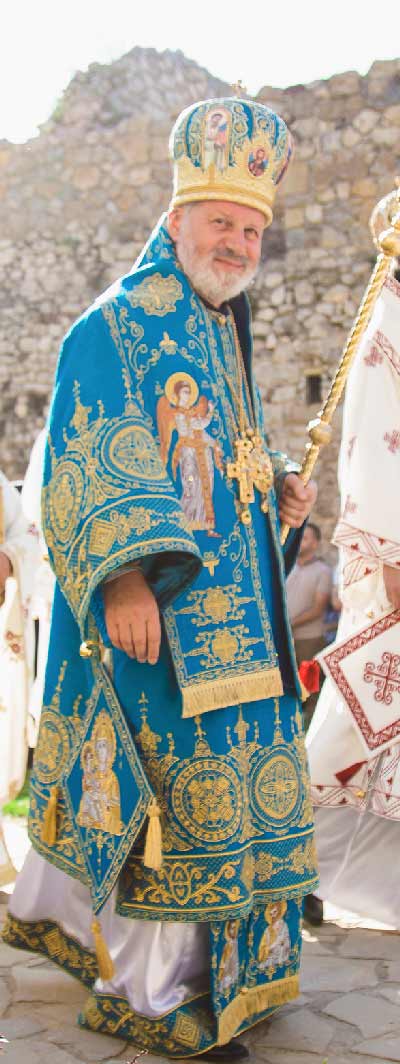
But even if this were not the case and there was no misuse of scientific advances, the fact still remains that one cannot escape the vicious circle of death through his own force. Our entire “advanced world”, which includes medicine, and which has advanced so much in recent times, is, in fact, revolving in the vicious cycle of death: new medicines and devices are created in medicine against many diseases, but new diseases are being created at the same time, and so the circle turns. This has also been demonstrated by the latest Coronavirus pandemic in our time. All of our mighty human knowledge and achievements are simply useless to save us from this tiny, almost invisible organism that sows death.
Thus, it is simply impossible for man to secure his life alone without God. Of course, the very belief in God, that he is the only master of life and death, has an eschatological character in Christianity. That will be shown at the end of history. What remains now when it comes to believing in God is that we cannot live without the help of God, i.e., Other, and to turn this faith into a relationship towards other people and the world. For us to understand that we cannot exist on our own and that the other, however different that others may be in many life situations, is the source of our existence. That is also demonstrated by this pandemic, which is beginning to unite people and nations in the fight against it. So, whether the world will draw lessons from this pandemic, in order to change the way of life, depends largely on those who teach and educate future generations. The modern education system still insists on the development of human logic and man as an individual, according to that maxim of logic: perfect individuals – perfect society. I don’t think that is so. That’s why we need to change the ontology: from being (existing) as an individual, to being as a community with others.
There has been a lot of controversy between the SOC and the experts of the Crisis Staff on the fight against the virus, in terms of the way in which it is appropriate for believers to end their multi-week fasting and then also celebrate Easter. At the heart of the controversy was the question of whether faith can be practised outside the church, under the conditions of a state of emergency?
The essence of the Christian faith, especially Orthodoxy, is the Church, i.e. the liturgical community. Through liturgical assembly and communion, believers declare both their unity with God and their unity with other people and nature. That is why in Orthodoxy no one can serve the Liturgy alone, nor without the gifts of nature, bread and wine. The pattern of this is the Christian God who is the Holy Trinity, Father, Son and Holy Spirit – the community of personalities.
This community makes God simultaneously the Trinity and the One. Liturgy as a gathering around the first one that serves is indeed the iconic existence of the Holy Trinity. That is why Christians believe that liturgical unity will bring deliverance from death to the whole world. According to the words of St. Ignatius of Antioch, Liturgy is a “cure for immortality”. That is why every Liturgy is a celebration of the Resurrection, both of Christ’s and of our future one, and not just of the Resurrection.
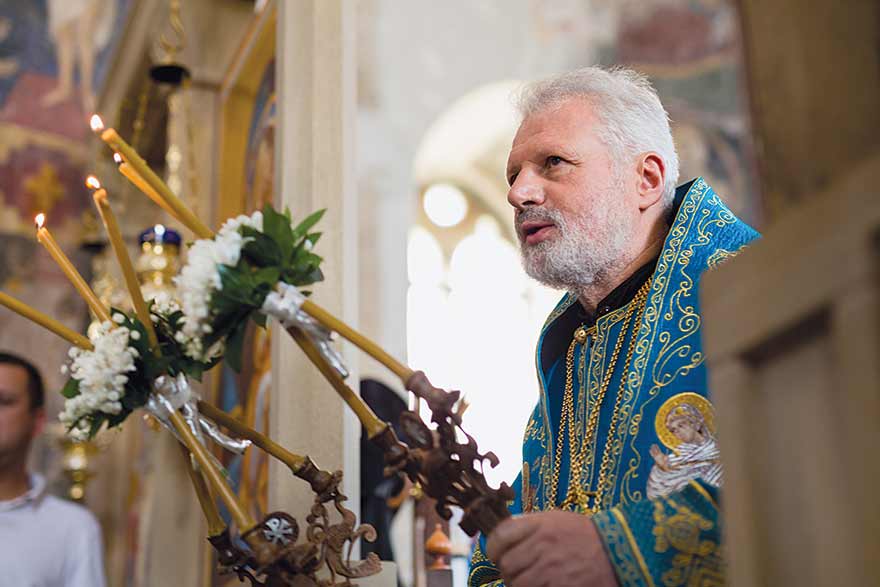
However, this unity is eschatological in nature. It will be shown in its full truth on the last day, at the end of history, when the Lord Christ comes again in power and glory. Then the world will become the “Cosmic Liturgy”, as stated by St. Maximus the Confessor, and will be set free from death. Until then, it is an expression of faith and faith as a liturgical practise. And that is why the Church refers to the importance of the Liturgy and Communion, but it can – for justifiable reasons – bless one’s Holy Communion without that being with attending the Liturgy. Such is the case with the sick. In these days of the pandemic, there is a real danger that the gathering of the people, even for the Liturgy, could turn into a source of spreading this deadly virus. That is why the Church heeded the word of health workers and advised the people to stay temporarily at home and for the Liturgy to be served by a priest with a maximum of two to three believers. Under these circumstances, the people can pray to God at home, but this cannot permanently replace the Liturgy.
The public has for some time now been following with interest the developments within the SOC, which the media have been reporting by suggesting that there is a conflict between church dignitaries. Is there any truth about the divisions within the SOC on various issues, from whether there is a place for more modern worldviews exist in the preaching of religion, through the autocephalous controversy prompted by the status of the Ukrainian church, to the attitude towards state politics in Kosovo?
The SOC has 45 bishops who participate in the Assembly and make decisions on various issues that relate to faith and life in general.
Their age ranges between 36 and 100. Given that all decisions are preceded by discussions, which may take several days, depending on the complexity of the issue, it is natural that – based on the aforementioned information – there are differing and conflicting opinions among the bishops. Decisions are made by consensus or by majority vote. All of them are executive and binding on all bishops, regardless of their earlier views that may remain the same. Some bishops may also express their opinions publicly. This does not mean, however, that there are opposing clans within the SOC who are fighting one another and tearing the Church apart.
Your departure from the post of dean of the Faculty of Orthodox Theology was explained by your refusal to remove from the faculty allegedly ineligible professors, at the request of the Synod. How do you expect the SOC to respond to the latest reaction from the rectorate of the Belgrade University, which also includes the Faculty of Orthodox Theology, which expresses concern over the “explicit ban on free speech imposed on a member of the University of Belgrade’s academic community”, Vukašin Milićević, an assistant professor at the Faculty of Orthodox Theology?
In the Church, there is an established order that everyone is obliged to respect, regardless of the duties and functions they hold, if – of course – they wish to belong to the Church. This should not be confused with human rights and various freedoms. Of course, various institutions take care of the preservation of this order, such as the bishops and the episcopal court, the Synod, the Great Church Court, the local Bishops’ Council, as well as the Ecumenical Council. If any member of the Church is accused of disturbing the church order and its unity, he is subject to the judgement of these institutions, which have the final say regarding that.
The problem with the Romanian Orthodox Church is that its actions divides the Church along national lines. However, the Church is above nations. It contains neither Greeks nor Jews nor Scythians, but rather all are children of God and people of God
The Faculty of Theology is an ecclesiastical institution and its work falls under the control of church bodies. It is also part of the composition of the University of Belgrade, and that obliges it to respect the laws that govern the University. The two sectors should differ, and in accordance with that, both the Church and the University should take care of their own domain. Professors and faculty staff must also know this and behave accordingly. If that is the case, and I don’t think there’s any reason for it not to be, then there will be no problem whatsoever.
Do you consider that the SOC, without some of the steps advocated by younger professors of the Faculty of Orthodox Theology, can adequately communicate with younger believers of the so-called digital era, which largely shapes their relationship to the world?
I am the first to advocate the thesis that the Church is not a museum exhibit that should be kept and admired as something that existed in the past. Nor is theology a repetition of what the Holy Fathers once said. There are many challenges for the Church in present times that didn’t exist in the past. You have provided an example of digitalisation. This implies that her approach is also changing, with a consideration of time. However, this does not mean adapting the Church to the world, as many young theologians think, in order for the Church to survive in it and find its place.
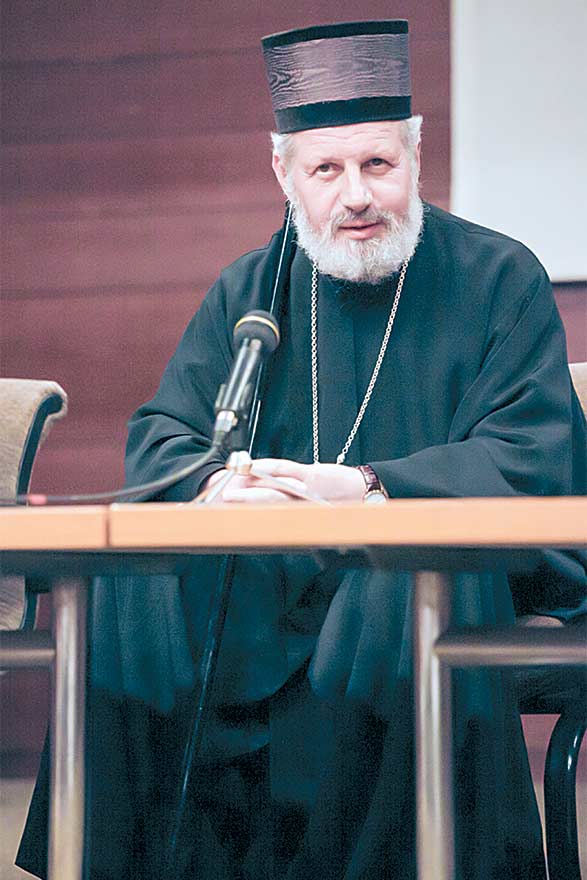
The church is not of this world but is in the world, and it is called to act in it and to fulfil its mission at all times. So, it is clear that the Church needs to take strides forward and innovate at all times, but it is also clear that not every innovation in the Church is in the spirit of the Church. There is always a danger of secularisation of the Church. That’s why it is necessary to have a good familiarity with the essence of the Church, which differs significantly from everything else in the world.
The objective of the Church’s existence in the world is to save the world from death. Its activity, thus, depends on the purpose for which the Church is in the world. This goal of the Church is very often unknown, both to those in the Church and those outside it, or, if it is known, there is a lack of conformity as to how that is to be accomplished. The church should always have a critical approach to the world, or rather, more precisely, it is there to be in judgement of the world. This, of course, implies that you first know what is devastating to the life of the world and that you are critical in order for it to change, pointing to the solution offered by the Church, in order for that not to be merely criticism for the sake of criticism. This, of course, is no mean feat. There are many theologians, but do they all know what the essence of the Church is, as well as what is fundamentally bad in the world in which they live, in order to change that?!
For example, most people today, especially youngsters, both those in the Church and those outside the Church, mostly communicate via computers and mobile phones and have no need for live contact.
I wonder how they view liturgical assemblies and Communion, where a completely different kind of communication is realised between people, and which represents the very essence of the Church? On the other hand, another very delicate problem exists in theology. Can a theologian know theology and gain insight into what is wrong in the society in which he lives, but if he himself is a slave to that way of life, how will he criticise it? He is more likely to justify it, in order to justify himself, rather than criticise it.
Before the world came to a halt due to the fight against the coronavirus, a battle was being led in Montenegro against the Freedom of Religion Act, which you at the SOC consider as an attempt to take on the SOC and place its property under state control. Given that talks between representatives of the Eparchy of the Metropolitanate of Montenegro and the Littoral and the Government of Montenegro have begun, do you believe a solution can be found that will satisfy both parties?
There is an obvious tendency, which dates back to Tito’s period, to break the unity of the SOC through the creation of quasi-churches or schismatic groups. It is a well-known fact that the Communist leadership constantly pointed its finger at the Serbian Church as being a “disruptive factor”, because it was convinced that the Church, among other things, kept the Serbian people in unity, wherever they were. The dividing of Serbs and weakening of their ideological identity depends directly on the smashing of the Church and its unity. I think that such a policy still continues in Montenegro, as well as in other places. So, this is also the essential background of this latest law, which has been adopted in Montenegro relating to the Church.
In the Church we are all one. The Church also demonstrates that with its organisation, which is established on the basis of territory and not on a national basis
Of course, other motives also exist, such as church properties by the sea that are highly prized and the like, but in my opinion, this first factor is the foundation of that law. I would like a just solution to be reached regarding the relationship between the Montenegrin authorities and the Serbian Church in Montenegro, but that would imply the authorities giving up their dividing of the Serbian people, which I don’t think will happen. At least until they find another model to achieve that goal. This is especially because that is also in the interest of the West at this juncture.
One of the states that reject calls to recognise Kosovo’s independence is the Vatican. To what extent is such a decision a result of contact between the Roman Catholic Church and the Serbian Orthodox Church?
The SOC and the Roman Catholic Church have been on good terms in recent times. And this is because there has been a great shift in the attitude of the Roman Catholic Church towards the Orthodox Church in general, and towards us in particular. This is especially so following the Second Vatican Council, which recognised the Orthodox Church as a sister Church. I don’t precisely know the reason why the Vatican does not recognise Kosovo’s independence. I presume that’s the fruit of our good relations.
A large part of the public in Serbia considers that the SOC opposes any form of ecumenical dialogue. Does such an impression correspond with the real state of relations and cooperation between the SOC and the Roman Catholic Church?
It is not true that the SPC opposes ecumenical dialogue. On the contrary. An official Mixed Commission for Dialogue between the Orthodox Church and the Roman Catholic exists with the aim of achieving unity between the two Churches. Our Church is also a member of that Commission, specifically, I am personally one of the representatives of our local Church. In addition to this, our Church also participates, through its representatives, in dialogue with other Christian churches, as well as with non-Christian communities.
What would have to happen for a visit to Serbia of the head of the Roman Catholic Church, Pope Francis, to be acceptable to the SOC?
In principle, our Church has nothing against His Holiness the Pope visiting our country and our Church. No significant barriers to such a visit exist. At the moment, however, I consider that such a visit would not have beneficial effects for both Churches, due to some recent events and interventions by Western powers in our country, which are still fresh in the memories of our people. That is why it has been delayed for a while until the situation normalises.
You were once engaged in a committee for negotiating the overcoming of problems between the SOC and the Romanian Orthodox Church with regard to the issue of whose right it is to worship in the Timok Frontier region and the Braničevo district. Has that dispute been resolved?
The problem with the Romanian Orthodox Church is that its actions divide the Church along national lines. However, the Church is above nations. It contains neither Greeks nor Jews nor Scythians, but rather all are children of God and people of God. Ethnophyletism in the Church was condemned at a pan-orthodox level in the Assembly of Constantinople in 1872.
In the Church, we are all one. The Church also demonstrates that with its organisation, which is established on the basis of territory and not on a national basis. All believers from one place, one diocese, regardless of their national, racial and other characteristics, belong to that diocese and are under the spiritual oversight of the bishops of that diocese. The Romanian Church would like to separate Romanians from our Church, which they belong to on the basis of birth, Christening and residence, and to annex them to the Romanian Church because they are ethnically Romanian. This is not permitted and contradicts the nature of the Church, which is supranational.
For now, the non-canonical (illegal) activities of the Romanian Church on the territories of some of our dioceses have not ceased, but I have hope in the Lord that our brothers, the Romanian bishops, will also realise that this is devastating for Orthodoxy as a whole, and will cease with such activities.
| DISCOVERIES
The whole of history, and particularly the events of the last two centuries, are related to scientific discoveries, for which huge sums of money are allocated on the basis of the excuse that they serve to improve living conditions |
THESIS
I am the first to advocate the thesis that the Church is not a museum exhibit that should be kept and admired as something that existed in the past. Nor is theology a repetition of what the Holy Fathers once said |
POLICY
The dividing of Serbs and weakening of their ideological identity depends directly on the smashing of the Church and its unity. I think that such a policy still continues in Montenegro, as well as in other places |
|---|